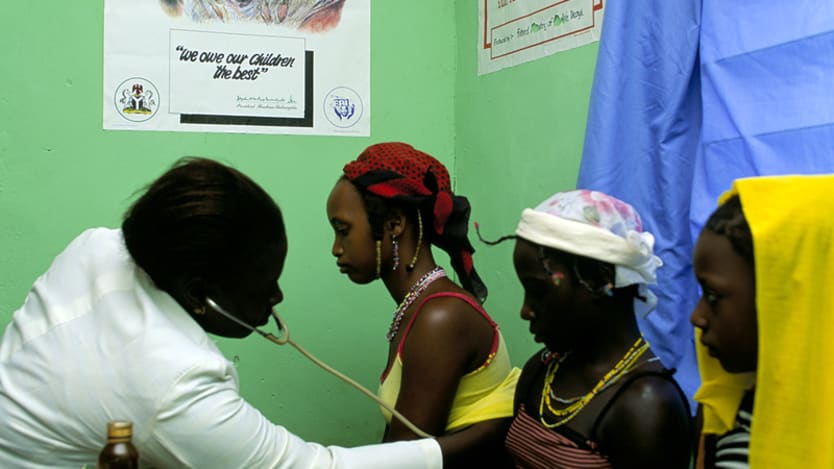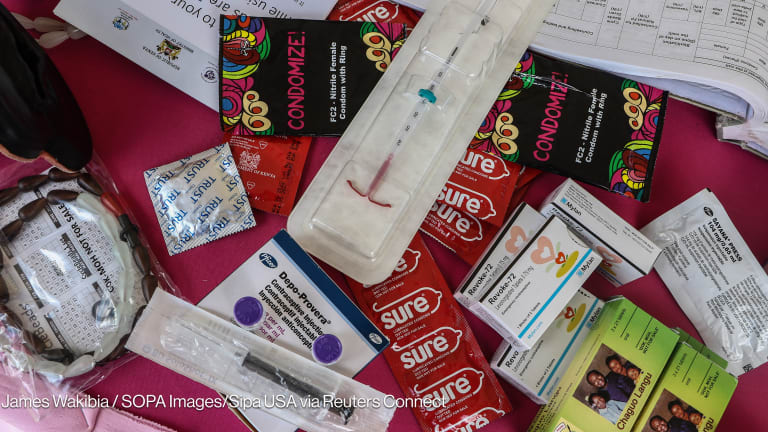'Global gag rule' expected to hit safe abortion, contraceptive use in Nigeria

ABIDJAN, Ivory Coast — Marie Stopes International in Nigeria is bracing for a dramatic drop in funding, following United States President Donald Trump’s decision to reinstate the Mexico City Policy, or “global gag rule.”
MSI declined to sign onto the policy, which would require them to cut all services and information relating to abortion, and will therefore forfeit all funding from the U.S. Agency for International Development.
The loss of U.S. support stands to jeopardize recent progress in reducing Nigeria’s maternal death rate, the organization told Devex. Nigeria is home to the 4th highest maternal death rate worldwide, according to the most recent World Bank statistics.
USAID funding allowed Marie Stopes Nigeria to administer at least one family planning method for 785,000 women last year. Unless new donors are secured, MSI programs could be drastically reduced or even completely eliminated.
The U.S. policy, which has been implemented and repealed on and off since the 1980s, restricts any non-U.S. NGO that receives U.S. government funding from providing services or information related to abortions, regardless of its legality in a particular country. The policy was expanded under the Trump administration. The so-called “Protecting Life in Global Health Assistance” policy is expected to affect $8.8 billion in international health care funds.
If U.S. funding were maintained, MSI Nigeria estimates that it would have prevented about 1.8 million unintended pregnancies, blocked about more than half a million abortions and avoided more than 10,000 maternal deaths, between 2017 and 2020.
—Nigeria has one of the world’s highest unsafe abortion rates, and MSI Nigeria country director Effiom Effiom told Devex the global gag rule could see those numbers rise. “Each year we have over 40,000 deaths thanks to unsafe abortions so this [policy] is taking us way, way back,” he said.
Maternal and child welfare could also suffer in Africa’s most populous country, he warned, if women lose access to contraceptives and other health services. “We know a good way to protect maternal and child health is the timely spacing of births,” Effiom said.
Expanded rule, expanded impact
In Nigeria, nearly two-thirds of all female adolescent deaths are due to unsafe abortions, often sought as a last resort to end an unwanted pregnancy. Abortions are largely prohibited in Nigeria, except in cases where childbirth would endanger the mother’s health — prompting many women to seek care from unauthorized, unskilled individuals.
In Colombia, 'global gag rule' punishes conflict-affected populations
Colombia is a prime example of the 'global gag rule’s' punishing grip on integrated programs that have nothing to do with abortion. In villages still reeling from 50 years of war, the shuttering of Profamilia’s U.S. Agency for International Development-funded program and the reproductive health care and community therapy it provides is a blow to a slow healing process.
Effiom said U.S. funding greatly boosted Nigeria’s health care system through the training of 4,500 government health care providers to distribute long-term contraceptives to 600,000 women at government-run health centers.
“When we talk about the impact of the Mexico City Policy, this is where it will hit our work the hardest,” Effiom told Devex. “With $9 million over three years, we were able to provide long-acting contraceptive methods through a voluntary and balanced counseling approach, scaling up the health care system in the country.”
Methods such as the birth control implant and IUD, which can provide 3 to 10 years of protection, were targeted by the Nigerian government as key tools to boost maternal and reproductive health. As of 2013, just 10 percent of women in Nigeria used modern contraceptive methods — one of the lowest rates in the world.
Nearly 70 percent of all long-acting methods recommended by the Nigerian government are delivered from sites supported by Marie Stopes.
As a way to increase contraceptive use, last year the Nigerian government relaxed distribution policies to allow lower cadre staff to administer long-acting methods. Until recently, only doctors and nurses were authorized to do so.
The policy change meant that a fully-funded MSI program “could have intervened more,” Effiom said. “We could’ve moved more downscale and worked more in conflict areas and this would have given the people still left in those regions potential work.”
If U.S. funding were maintained, MSI Nigeria estimates that it would have prevented about 1.8 million unintended pregnancies, blocked about more than half a million abortions and avoided more than 10,000 maternal deaths, between 2017 and 2020.
Filling the gap
Effiom told Devex that MSI Nigeria is expecting to “feel the full effect” of the global gag rule for years to come.
Anti-'global gag rule' campaign seeks private sector, philanthropic support
Devex spoke to outgoing Dutch Development Minister Lilianne Ploumen, creator of the She Decides fund, about how the campaign can reach its $600 million annual fundraising goal despite a change in government.
“During the [George W.] Bush era when they reinstated the gag rule, it’s noted that there were higher rates of abortion in sub-Saharan Africa and that’s essentially because when you reduce women’s access to contraception which leads to unintended pregnancies, they result to abortions,” Effiom said, calling the policy harmful and counterproductive.
Though some funding has already been allocated for next year, MSI Nigeria is currently soliciting other donors to avoid a disruption in programs.
“We have some allocated funding for next year, so we have this period to start talking to donors.” he said. Effiom expects to target Scandinavian and Nordic countries particularly. The British and Canadian governments are also expected to boost their global spending on family planning to help bridge the gap.
For more Devex coverage on global health, visit Focus On: Global Health
Search for articles
Most Read
- 1
- 2
- 3
- 4
- 5








